Stay in the know on all smart updates of your favorite topics.
Debate Smart Cities or Dumb Cities
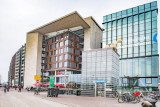
Toronto seems to become a testing ground for the urban development of smart cities. Sidewalk Labs, part of Google’s parent company Alphabet, will redevelop the city’s waterfront. Data will be used to design smarter, more sustainable designs, to handle waste better or to reduce our energy consumption. But with Google at the helm, data is also the capital of this city district: and what does that lead to? It is time to start the discussion with architects.
During the Architecture Residency of Do Janne Vermeulen we will organise a debate about smart cities on Tuesday 21 May. We discuss the developments of data in Amsterdam, look at the developments in Toronto and talk about the position of the architect. Through this debate we hope to feed the discussion from a design perspective.
What’s the question?
Architect in Residence Do Janne Vermeulen, architect and co-founder of Team V, visited Canada and is bringing the debate to the Netherlands. While reading, watching, writing and talking about smart cities, it is tempting to think in terms of technology instead of the city. Rather than “What do we want and how does smart technology offer a solution for that?” it is about “What possibilities does smart technology offer and what can we achieve with it?”
Privacy issues make the conversation even more difficult and sometimes make us long for the ‘stupid city’. But our spatial domain and the digital world are becoming more and more interconnected. Can we grow, densify and become more sustainable without smart systems? Is technology indeed the answer to our questions? What is exactly the problem with ‘stupid cities’? What are the benefits if we focus on digital technologies, analyse large amounts of data and provide the city with systems and IoT (Internet of Things) sensors? And what other means do we have? In short, a lot of questions to which smart technology might be the right answer. And maybe not.
Programme and speakers
Do Janne Vermeulen – Team V – Co-founder and architect
Meat Do Janne Vermuelen as our second Architect in Residence. She gives a short pitch about the role of big data in her field of expertise.
Marleen Stikker – Waag Society – Founder
Marleen Stikker supervises the digitisation of society with research and all kinds of initiatives from Waag Society. This evening she will share her views on the developments concerning Big Data. She also offers perspective on the role of the architect within smart cities.
Ger Baron – City of Amsterdam – Chief Technology Officer (CTO)
Ger Baron, the first CTO of Amsterdam, brings us up to speed on technological innovation and the digital transformation of Amsterdam.
Emil Zelic – Waterfront Toronto – Executive Director Project Management Office & IT
As an IT professional, Emil Zelic, who will fly in from Toronto, tells about where application and disruption of smart technologies meets design practices. He reflects on the progress and philosophises about the Smart City applicability in Amsterdam.
The lectures are followed by a debate between the audience and the speakers.
Smart Cities or Dumb Cities
Architect in Residence Debate: Do Janne Vermeulen, Team V
Date: Tuesday 21 May 2019
Time: Starts at 8PM / Door open at 7.45PM
Location: OBA Oosterdok, auditorium, Oosterdokskade 143
Language: ENGLISH
Tickets: € 12,50
Online tickets available at our ticket page
Smart Cities or Dumb Cities - a debate at OBA Oosterdok
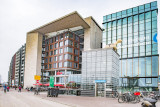
Toronto seems to become a testing ground for the urban development of smart cities. Sidewalk Labs, part of Google’s parent company Alphabet, will redevelop the city’s waterfront. Data will be used to design smarter, more sustainable designs, to handle waste better or to reduce our energy consumption. But with Google at the helm, data is also the capital of this city district: and what does that lead to? It is time to start the discussion with architects.
During the Architecture Residency of Do Janne Vermeulen we will organise a debate about smart cities on Tuesday 21 May. We discuss the developments of data in Amsterdam, look at the developments in Toronto and talk about the position of the architect. Through this debate we hope to feed the discussion from a design perspective.
What’s the question?
Architect in Residence Do Janne Vermeulen, architect and co-founder of Team V, visited Canada and is bringing the debate to the Netherlands. While reading, watching, writing and talking about smart cities, it is tempting to think in terms of technology instead of the city. Rather than “What do we want and how does smart technology offer a solution for that?” it is about “What possibilities does smart technology offer and what can we achieve with it?”
Privacy issues make the conversation even more difficult and sometimes make us long for the ‘stupid city’. But our spatial domain and the digital world are becoming more and more interconnected. Can we grow, densify and become more sustainable without smart systems? Is technology indeed the answer to our questions? What is exactly the problem with ‘stupid cities’? What are the benefits if we focus on digital technologies, analyse large amounts of data and provide the city with systems and IoT (Internet of Things) sensors? And what other means do we have? In short, a lot of questions to which smart technology might be the right answer. And maybe not.
Programme and speakers
Do Janne Vermeulen – Team V – Co-founder and architect
Meat Do Janne Vermuelen as our second Architect in Residence. She gives a short pitch about the role of big data in her field of expertise.
Marleen Stikker – Waag Society – Founder
Marleen Stikker supervises the digitisation of society with research and all kinds of initiatives from Waag Society. This evening she will share her views on the developments concerning Big Data. She also offers perspective on the role of the architect within smart cities.
Ger Baron – City of Amsterdam – Chief Technology Officer (CTO)
Ger Baron, the first CTO of Amsterdam, brings us up to speed on technological innovation and the digital transformation of Amsterdam.
Emil Zelic – Waterfront Toronto – Executive Director Project Management Office & IT
As an IT professional, Emil Zelic, who will fly in from Toronto, tells about where application and disruption of smart technologies meets design practices. He reflects on the progress and philosophises about the Smart City applicability in Amsterdam.
The lectures are followed by a debate between the audience and the speakers.
Smart Cities or Dumb Cities
Architect in Residence Debate: Do Janne Vermeulen, Team V
Date: Tuesday 21 May 2019
Time: Starts at 8PM / Door open at 7.45PM
Location: OBA Oosterdok, auditorium, Oosterdokskade 143
Language: ENGLISH
Tickets: € 12,50
Online tickets available at our ticket page
Looking for a job opportunity in the areas of smart cities / digital transformation
I am a Smart Cities Consultant, actively looking for opportunities in the areas of Smart Cities, Digital Transformation, Livable Cities, Sustainable Development, Urban Mobility, ICT/ IoT, Strategy Planning, Project Management, Urban Management, Urban Economic Development, Urban Governance, Feasibility Studies, Technical Research, and Development.
I hold a Masters degree from Germany with specialization in Urban Agglomerations. I would be happy to hear from you pointing out at any leads or opportunities.
Thanks in advance,
Kind Regards,
Anuradha
Digital Perimeter
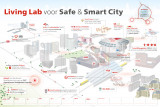
By implementing innovative smart & digital solutions, the digital perimeter allows us to experiment with applications that deliver safety & security while providing the visitor with an even better fan experience.
Please do share your comments and thoughts with us as we are currently exploring our technical options with partners within the eco-system.
Bedrijfsleven roept op tot samenwerking Smart City ontwikkeling
Veel pilots, veel projecten, veel aandacht, veel events maar ... waar blijft de brede toepassing? Hoe kunnen we de pilots opschalen, successen in andere steden toepassen?
Wat volgens het bedrijfsleven zal helpen, is een centrale regie gevoerd door overheid en bedrijfsleven.
Bekijk hier de video met de oproep.
Of ga naar de website https://nlsmartcities.com voor meer informatie en meer video's.
How do you build privacy-friendly systems?
Suppose you want to know how many cars travel across a certain road. You could build a system that registers all license plates driving by. But you could opt for a system that will simply place a tally mark for every car that passes by. Both systems serve the same function: they count cars. However, the first one is a privacy nightmare. The second system is designed in such a way that it cannot document any personal information. Privacy is not a factor that you can just tack on a system after the fact; it needs to be included in the design phase as a requirement. This design philosophy is called privacy-by-design. Can we work towards Tada-by-design?
We think we can.
Read all about it on the Tada blog:
Tada and the City of Amsterdam: The first six months.
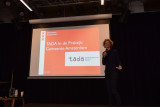
From https://tada.city - Reading time: 6-8 minutes
“Tada is a movement,” says Douwe Schmidt during the opening of the Tada in practice meeting. “It is the interaction of a large number of organizations and individuals that are focusing on the question: ‘What kind of digital society do we want?’ It is no longer a matter of determining whether or not we will have one. Now it is all about how to put that society into practice.” Over the past four months, the Municipality of Amsterdam and Bureau Tada have worked together to explore how the six Tada values can be put into practice. At the meeting, insights were shared with nearly sixty participants.
The practical implementation of Tada does not translate into a one size fits all approach. Unlike prescriptive legislation such as the General Data Protection Regulation, Tada is not a user manual that provides specific rules. Ethical principles like ‘the human factor’ and ‘from everyone – for everyone’ are soft values that need to be reinterpreted time and again. “Ethics cannot be outsourced,” says Tessa Wernink, who partners with Schmidt in Bureau Tada. “It is important for everyone to think about that in their work. Tada has taken the first steps by formulating six principles. These six points are not much different than established ethical values. But now it is a matter of applying them to the digital domain.”
“It is allowed, but we won’t do it”
Two speakers share stories from their own practice. Koen van Nol, legal expert at Schiphol, is involved in a pilot project involving ‘biometric boarding’ at the airport. In the experiment, boarding pass checks and passport checks are replaced with facial recognition. One of the insights Van Nol shares is that your organization’s identity plays a role in the decision-making process. “At each step, we verify whether it is legally allowed and whether it is technically possible. But in some cases, we reach the conclusion: it is allowed, it is possible, but we are not going to do it. That has to deal with the Schiphol identity. I have noticed in conversations with colleagues that Schiphol employees consider that very important. As a semi-government body, we believe that we hold a certain responsibility towards our customers.”
Jaap-Henk Hoepman, senior university lecturer at Radboud University in Nijmegen, explains how to make abstract values more tangible, transposing them into technical projects: “Privacy is a soft term. It is partly about ethics and partly about legal aspects. That makes it harder to implement than more tangible software attributes like security or performance.” To offset that, Hoepman developed eight privacy-by-design strategies. One of those strategies is minimization: do not collect more data than necessary. Another is abstraction: only share the specific information that is needed. For instance: the Gall&Gall sales employee does not actually need to know your date of birth; they just need to know if you are over 18.
Lessons Learned
G4 trainee Milou Jansen then stepped up on stage. For six months, she worked with Tada Agency on implementing Tada in the Municipality of Amsterdam, adopting the role of Values & Digitalization consultant. She shared some insights that recurred frequently during that project: Decisions about responsible data use must be taken at all levels of the organization. However, it is still all too common to see such decisions ending up with the data analysts. This could result in the unintended situation where data analysts become some type of gatekeepers, who need to encourage other people to use data responsibly. It is important for other employees to also consider this their responsibility. As a result, thinking about data use becomes an integrated part of everyone’s work. By extension, clients and contractors share a joint responsibility for data use. It is therefore important to discuss this at the beginning of a project. Take the time early in the process to carefully consider everything together. That will prevent delays later on in the process: take a moment to think at the start so you can accelerate later.
What can we do in tangible terms?
Milou Jansen bids farewell to the Municipality of Amsterdam to continue her traineeship in Utrecht. That is why she invited the attendees to join her in considering the question: ‘what next?’ during the interactive part of the meeting. The attendees joined in a discussion about applying Tada in the Municipality of Amsterdam. The discussion clearly revealed two things. On the one hand, it was considered valuable that Tada does not provide strict guidelines, but rather requires constant reflection. On the other hand, there is also a need for certainty – not just for civil servants, but also for citizens who need to be able to monitor what the municipal authorities are doing. People offered ideas related to both aspects in order to anchor Tada in the organization.
First, people in the organization need to become aware of Tada. Communication as well as meetings arranged within the organization will help create support amongst municipal employees. That should lead to a sense of responsibility which is felt by all the process owners, not just the specialists. Tada is not an exact science, so it requires employees to use their moral compass. That takes time: time to think, time to engage in dialogue, time to ask each other questions. People also mentioned developing a course on Tada, ethics and technology, and appointing ambassadors.
A number of suggestions were also made for ways to express Tada in more tangible terms. Pick a spot on the horizon: what is our course of action with Tada? Based on that distant view, we can draw up clear policy frameworks and work processes. Also appoint watchdogs that monitor the Municipality – like consultative groups, ethical advisory committees or a digital union. Finally, someone suggested expressing the abstract Tada values in more tangible terms by providing examples from actual practice. That will create common ground based on examples.
The conclusion of the overall discussion was that a cultural change is needed. The word Tada should not evoke confused questions; instead, it should be met with enthusiastic recognition. Not: Tada? But: Tada!
The Tada in practice meeting was a co-production of the Municipality of Amsterdam and Bureau Tada. It took place on 20 February 2019 at the Stadstimmertuin in Amsterdam.
Tada principes opgenomen in Agenda Digitale Stad
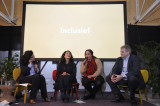
De eerste Amsterdamse Agenda voor de Digitale Stad werd op 1 maart gelanceerd. De agenda getiteld ‘Een digitale stad voor én van iedereen’ streeft naar een vrije, inclusieve en creatieve digitale stad. Verantwoord gebruik van data is daar een onderdeel van. Eén van de acties om dat te bereiken is de implementatie van het Tada manifest.
Wethouder Digitale Stad Touria Meliani presenteerde de Agenda in het vrolijk ogende pand van The Beach/Garage Notweg, een laboratorium voor sociale en duurzame innovatie in Nieuw-West. Ze wist meteen de aandacht te vangen van het 150 koppige publiek door het delen van persoonlijke data. Op het scherm toonde ze een WhatsApp gesprek met haar moeder. “Mijn moeder zou het liefst willen dat ik elke week op bezoek kom, maar dat kan niet want ze woont ver weg. Daarom delen we veel via WhatsApp. Ze is laaggeletterd daarom communiceren we veel via foto’s en audioberichten. We hebben persoonlijke gesprekken via dit systeem maar we weten niet wat er met die berichten gebeurd. Mensen stoppen hart en ziel in hun telefoon maar de bedrijven die achter deze technologie zitten, hebben andere bedoelingen. Hier zie je op een heel alledaags niveau een risico van digitalisering. De digitale stad gaat over de mensen die daar mee te maken hebben. En dat zijn wij allemaal.”
Amsterdam implementeert Tada manifest
Met haar voorbeeld legde wethouder Meliani één van de uitdagingen bloot die in de Digitale Agenda wordt benoemd. De dataverzameldrang leidt ertoe dat sommige partijen steeds meer macht krijgen. De data kan worden aangewend om gedrag te beïnvloeden en mensen te manipuleren. Daarmee wordt de vrijheid van Amsterdammers aangetast. De stad wil hier tegenwicht aan bieden. Amsterdam zet zich in voor betere regels die de privacy en autonomie van burgers waarborgen. Dat doet het niet alleen, maar in samenwerkingsverbanden op nationaal en internationaal niveau. Op lokaal niveau voegt de gemeente daad bij woord door verantwoord met data om te gaan. In het komend jaar gaat ze de Tada principes in de eigen organisatie implementeren.
In discussie over technologie
Douwe Schmidt van Bureau Tada kreeg het woord om het publiek meer over Tada te vertellen. “Tada is ontstaan uit een brede coalitie van burgers en organisaties. Die zijn in gesprek gegaan over de digitale stad en hoe we die willen vormgeven. Daar is het manifest ‘Tada – duidelijk over data’ uitgerold. Hierin worden zes principes benoemd die in de digitale stad zouden moeten gelden.” Een van die principes is bijvoorbeeld ‘inclusief’: de digitale stad moet, net als de fysieke stad, toegankelijk zijn voor iedereen.
Schmidt: “De volgende stap is om de Tada principes in de praktijk te brengen. Hoe vertaal je die abstracte waarden in iets concreets? Bureau Tada werkt samen met de gemeente om daar vorm aan te geven. We hebben workshops ontwikkelt waarin we praktisch met Tada aan de slag gaan. Eén van de methoden die we gebruiken is het spectogram. Daarmee starten we een discussie door naar concrete casussen te kijken.”Om een beter idee te krijgen hoe dat werkt, nodigde Schmidt de 150 aanwezigen uit deel te nemen aan een principiële discussie over technologie. Hij legde het publiek een stelling voor. Wie voor was ging staan, tegenstemmers bleven zitten. Bij de stelling ‘Amsterdam zal nooit gezichtsherkenning gebruiken’ stond een flink aantal mensen op. “Er wordt al op zoveel plekken data opgeslagen”, zei één van de voorstemmers, “en we hebben geen idee wat er mee gebeurd. Dus laten we voorlopig even wachten met het aanleggen van nog meer dataopslagplaatsen.” Een tegenstemmer beargumenteerde: “De bezwaren die je kan hebben tegen gezichtsherkenning, kan je te niet doen met technische oplossingen en goede regels.” Er was ook iemand die zich in beide standpunten niet kon vinden: “Je moet niet van die boude uitspraken doen waarin het alles of niets is. Misschien vind je dat je geen camera’s met gezichtsherkennning op straat moeten worden geplaatst. Daar kan je een debat over voeren. Maar vooraf technologieën uitsluiten zonder daar een gesprek over te voeren, is niet de juiste weg.” Schmidt: “Zo zie je maar dat als je casussen gaat bespreken er direct discussie ontstaat. Mensen willen hier met elkaar van gedachte over wisselen. Tada is begonnen met het benoemen van principes waar we de digitale stad op willen stoelen. Nu maken we een verdiepingsslag door er met elkaar over te praten en de principes concreet toe gaan passen.”
Privacy in de digitale stad
Na de presentatie van Tada nodigde wethouder Meliani verschillende mensen uit op het podium. Voor het ontwikkelen van de Digitale Agenda legde ze veel werkbezoeken af. Ze ontmoette veel mensen die haar inspireerden. Met een aantal van hen ging ze tijdens de lancering in gesprek. Met Marleen Stikker van De Waag sprak ze over privacy. Stikker: “Het woord privacy is aan erosie onderhevig daarom spreek ik liever over zelfbeschikking. Zeg je privacy dan hoor je vaak: ‘ik heb niets te verbergen’. Maar het gaat er niet om of je iets op je kerfstok hebt staan. Dat zie je aan het gesprek tussen wethouder Meliani en haar moeder. Het gaat om de wens de privé sfeer te behouden. Bij zelfbeschikking gaat het over de vraag: maken wij nog onze eigen keuze? We worden genudged en gemanipuleerd. Zelfbeschikking is een hoeksteen van de rechtstaat. Maar op het digitale gebied wordt ons heel veel uit handen genomen.”
Mark Wiebes van de Nationale Politie zei over privacy: “Tijdens de Tada discussie kwam het dilemma van gezichtsherkenning herkenning aan de orde. Het is heel verleidelijk om dat soort technieken in te zetten voor opsporingsonderzoek. Maar iedereen die bij de politie gaat, zweert een eed om burgers en burgervrijheden te beschermen. Privacy is één van die vrijheden. Maar technologie moet je ook niet zonder meer aan de kant zetten. Het niet gebruiken van technologie heeft ook een prijs. Dus moet je verschillende mogelijkheden overwegen. Bijvoorbeeld het inbedden van privacyregels in de technologie.”
De wethouder vertelde over twee concrete acties uit de Digitale Agenda die de privacy van Amsterdammers doet verhogen: “Alle burgers krijgen een Mijn Amsterdam, een persoonlijke digitale omgeving. Hier kan je inzien welke gegevens de gemeente over jou heeft opgeslagen.” Daarnaast wordt half maart een digitale kaart gelanceerd waarop slimme apparaten zijn aangegeven. Hierop kunnen burgers zien waar de gemeente camera’s en andere meetinstrumenten heeft geplaatst. Ook kan worden bekeken welk type data de sensoren verzamelen.
Een inclusieve digitale stad
Over de inclusieve stad sprak de wethouder met Fatimzahra Baba van stichting Saaam. Saaam helpt laaggeletterde moeders bij het begrijpen van social media. Hun kinderen gebruiken social media en hebben zo een wereld waar de ouders niet bij kunnen. Er worden onderwerpen besproken als exposing (het delen van ongewenste foto’s of verhalen op social media). Een dochter die dat had ondervonden was depressief geraakt. Ze praten met elkaar over hoe de digitale weerbaarheid van hun kinderen te vergroten. Baba: “Over laaggeletterde moeders wordt vaak gezegd: ‘Ze kunnen niet en ze willen niet’. Maar dat is niet waar. Ze willen wel!”
“Inclusief betekent ook dat iedereen mee moet kunnen doen”, zei de wethouder. “Daarin hebben we als gemeente ook stappen gezet. We hebben met verschillende mensen om de tafel gezeten. Iemand met een fysieke beperking, een slechtziende. Zij wezen ons op tekortkomingen. Een slechthorende gaf aan dat sommige gemeentelijke informatie alleen telefonisch opgevraagd kan worden. Deze mensen moeten de digitale stad mee gaan ontwerpen. We zijn nog te weinig in staat vanuit een ander perspectief naar mensen te kijken. Maar als we een inclusieve stad willen is dat wel nodig.”
De bijeenkomst werd afgesloten met de officiële lancering van de eerste Amsterdamse Agenda Digitale Stad. In het voorwoord stelt wethouder Meliani: “De stad is van iedereen, de digitale stad ook.”
Check de Agenda Digitale Stad hier: <https://amsterdamsmartcity.com/posts/agenda-digitale-stad-gelanceerd>
Foto: v.l.n.r. Gülden Ilmaz (moderator), wethouder Touria Meliani, Fatimzahra Baba - stichting Saaam, Sander Klous hoogleraar Big Data Ecosystems Universiteit van Amsterdam.
(c) Henk Rougoor
SensemakersAMS on Banking of Things & Environmental monitoring
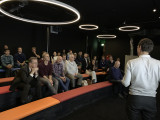
Every 3th Wednesday of the month we have presentations, open mic & discussions about IoT-related subjects. Doors open at 18.30 at our host Codam College for networking. Presentations start at 19h
19.00 LoRaWAN Environmental Real-Time monitoring
Reinhard Bischoff, manager director of Decentlab will talk about the development process of their LoRaWAN portifolio for environment measurements, the challenges and finally answer questions.
19.45 Banking of Things
Meet FINN, a young ING startup. They’ve built a solution that allows smart devices to pay autonomously. That means that with FINN, you can connect payments to triggers from any smart device. In this presentation, Lead Developer Pim (Stolk) will walk you through all the details.
Amsterdam Smart City - De Digitale Stad

Technologie speelt een steeds grotere rol in ons dagelijks leven. Maar ook in steden wordt digitalisering steeds belangrijker. Hoe houden we met een Smart City aanpak de Metropoolregio Amsterdam leefbaar? Hoe zorgen we dat digitalisering menselijk en voor iedereen toegankelijk blijft? Tijdens deze sessie van Amsterdam Smart City (ASC) kijken we naar verschillende projecten rondom digitaal ondernemerschap. Je krijgt de kans mee te denken over projecten met ASC en een aantal van haar partners. Wat zijn de ideeën van de gemeente? Op welke manier geven verschillende projecten vorm aan de digitale stad? En wat kan jij als bewoner van de stad doen?
Amsterdam Smart City
Amsterdam staat op plek drie in de European Digital City Index, die aangeeft in welke mate steden digitaal ondernemerschap ondersteunen. Amsterdam Smart City (ASC) speelt hier een belangrijke rol in. Met hun open innovatieplatform jagen ze transities aan, waarbij mensen centraal staan. Met verschillende partners verkent, verbindt en versnelt ASC technologische en sociale innovatie projecten in steden om tot een toekomstbestendige Metropoolregio te komen. Hoe verloopt de smart transition van steden? Wat is de toegevoegde waarde van smart innovation voor de Metropoolregio en haar inwoners? En welke rol speel jij in deze transitie?
ASC werkt met een focus op openheid en transparantie, het centraal stellen van de bewoner en samenwerking tussen publieke en private partijen. Één van de partners is de Gemeente Amsterdam. Zij zullen tijdens deze avond de Agenda Digitale Stad presenteren. Op welke manier zijn verschillende projecten van ASC al bezig om de uitgangspunten in de praktijk te brengen? En hoe zou jij zelf deze uitgangspunten vormgeven in de praktijk?
LET OP: Aanmelden via de site van Pakhuis de Zwijger: https://dezwijger.nl/programma/de-digitale-stad
5G
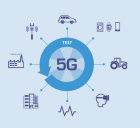
5G will be the new generation of mobile connectivity. The connection will be faster and more reliable, and will bring previously unknown possibilities for citizens and business. Amsterdam is exploring the opportunities and obstacles on the road to a safe and useful 5G network. One of the ways we do this is with our field lab in Amsterdam South East, from the train station to the Johan Cruijff ArenA. But also through regional, national and international collaborations.
Smart Republic 2019

Smart Republic 2019 is envisaged as a Multi Partner global forum to deliberate on the collaboration framework between government and multiple agencies like the World Bank, UN Habitat, UN Global Compact, Asian Development Bank, Industry and academia for achieving shared goal of making India a Smart Republic by 2022. Smart republic forum will focus on innovative ICT and New Media platforms and deployment of best practices to catalyse effective, coordinated and results-based implementation of 100 Smart Cities Program, AMRUT, HRIDAY and RURBAN missions to achieve the Sustainable Development Goals (SDGs). Smart Republic forum aims to contribute to achievement of following objectives:
Strengthen and deepen the collaboration among multiple implementing agencies working in the domains of smart cities and smart villages.
Fostering knowledge sharing among practitioners of Smart Cities and Smart villages programs to ensure adherence to global standards and good practices for accelerated achievement of Sustainable Development Goals.
Helping government agencies leverage private sector investment, knowledge and resources through innovative public private partnership models.
Support deliberations among multiple players to formulate structured mechanisms for improving cross-sectoral integration to accelerate deployment of sustainable smart city and smart village programs.
Facilitate sharing of good practices among the Smart City and smart village practitioners for development and deployment of Digital Platforms for transformative interventions across multiple thematic areas.
The Things Network: impact prijsvraag digitale economie
In 2016 hebben de overheden in de Metropoolregio Amsterdam in samenwerking met de Amsterdam Economic Board een prijsvraag digitale economie uitgezet. The Things Network was één van de winnaars die met een bedrag van € 500.000 aan de slag ging om het eerste – open en gratis te gebruiken – Internet of Things data netwerk ter wereld te ontwikkelen. Nu, twee en een half jaar later, kijken we wat er van deze ambitie is gerealiseerd en welke lessen zijn geleerd.
Freelance Friday: Internet@30
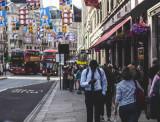
At the start of the year our one and only speaker is Steven Pemberton. His talks at Freelance Fridays have become a tradition for over 10 years now.
Steven Pemberton is a researcher, author and public speaker, based at the CWI, The Dutch National Research Centre for Mathematics and Informatics. His research is broadly in interaction, and how the underlying software architecture can better support users.
Steven Pemberton about his lecture this year:
“On 19th November 1988, The Netherlands became the first country outside of North America to connect to the open internet, making it truly international. I was one of the first handful of people to connect on that day. So how has it worked out in the intervening thirty years, and what can we still expect? I will discuss.”
Though he has become a Dutch citizen his talk will be in English.
Doors open at 19:00, we’ll start at 19:30.
NL
Ook dit jaar wijken we niet af van de traditie om aan het begin van het jaar een lezing te presenteren van Steven Pemberton.
Pemberton is onderzoeker, schrijver en spreker. Hij werkt in Amsterdam bij het CWI, het centrum voor wiskunde en informatica. Zijn onderzoek gaat in grote lijnen over interactie en de manier waarop software ontwerp gebruikers beter kan ondersteunen. In dat kader is hij ook betrokken bij de W3C (World Wide Web Consortium), dat de open internetstandaarden ontwikkelt en beschermt.
Steven Pemberton over zijn lezing dit jaar:
“On 19th November 1988, The Netherlands became the first country outside of North America to connect to the open internet, making it truly international. I was one of the first handful of people to connect on that day. So how has it worked out in the intervening thirty years, and what can we still expect? I will discuss.”
Hoewel Pemberton inmiddels de Nederlandse nationaliteit heeft aangenomen, zal zijn lezing en de voertaal van de avond Engels zijn.
Round Table – Smart City issues and experiences with collecting sensor data
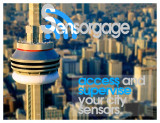
An open invitation to engineers, project managers, advisors and policy makers from regional cities with smart and sustainable initiatives. The round table talks will cover city sensor overview, and issues with collecting and aggregating sensor data. The benefits for the smart cities is that they will learn from the past experiences of their neighbours. The benefits for Sensorgage is the learnings we expect to extract so that we can best adapt our product to smart city needs.
Please contact me and I'll be happy to provide you with a Promotional Code for free access.
Smart buildings with IoT

What is the value of Smart Buildings with Internet of Things?
The choice for this national IT-Circle event’s theme Smart Building with IoT is not without a reason. Is IoT a hype or can it add value to owners, operators and users of buildings? What are challenges that need to be solved? Will smart buildings fit into the goal of providing healthy, safe, sustainable and pleasant working and living environments for the users? Will internet improve the buildings and the users?
During this informative national IoT event these questions – and many more – will be answered. The value of real-time data processing – and how to act on the data - will be presented. Next to that TU Delft will inform us about their Smart Building/Campus and we will have a look at the added value of LiFi. Obviously there will be time for questions and discussion during the sessions, the various breaks and lunch.
Sign up for the ICE IoT and learn more about Smart Buildings (use case), Smart Society (real time IoT data) and the use of IoT applications like LiFi.
NOTE: this event is for IT-CIRCLE MEMBERS ONLY. For more information about IT-Circle Nederland, see www.ITcircle-nederland.nl.
Looking for innovative and impactful IT solutions for public administrations
Do you want to become the next public sector digital champion? Submit your solution for the World Sharing and Reuse Awards by 28 February 2019!
On 29 November, Mariya Gabriel, the Commissioner for Digital Economy and Society officially launched the Sharing & Reuse Awards 2019. The contest will highlight the most innovative and impactful IT solutions for public administrations (both open source software and IT shared services).
The prizes that can be won are € 15 000 for the first team and € 10 000 for the runner-up in each of these 4 categories:
Most innovative open source software
Open source software with the biggest impact on citizens or businesses
Most innovative shared IT services (commonly developed or shared)
Shared IT services (commonly developed or shared) with the biggest impact on citizens or businesses
The Sharing and Reuse Awards will take place on 29 June, 2019 in Bucharest, Romania. If you would like to become a contestant in the awards, you can submit your solution before 28 February 2019.
Read more and propose your solution here: https://joinup.ec.europa.eu/collection/sharing-and-reuse-it-solutions/sharing-reuse-awards-2019
IoT Tech Expo Europe 2019
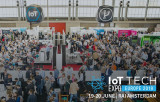
Europe’s leading IoT Conference Series; the IoT Tech Expo Europe will return to the RAI Amsterdam on the 19-20 June 2019 to bring together key industries for 2 days of top level content and discussion. Exploring the latest innovations within the Internet of Things and covering the impact it has on many industries including Manufacturing, Transport, Supply Chain, Insurance, Logistics, Government, Energy and Automotive, this conference is not to be missed.
Key topics examined include: smart building & facilities management, building the connected supply chain, intelligent city and transport management, smart grid data management and analytics, asset monitoring and management, delivering smart connected new products, and more.
The fourth annual Europe event will host 3 co-located events covering Blockchain, Cyber Security & Cloud and AI & Big Data, with 10,000 attendees expected to attend including CTO’s, Head’s of Innovation and Technology, IT Directors, Developers & Start-Up’s, OEM’s, Government, Automotive, Operators, Technology Providers, Investors, VCs and many more.
Mayor Franc Weerwind about the Digital Transformation of Cities
On December 4, the Mayors of over 40 cities were invited at the Committee of the Regions in Brussels to discuss the digital transformation. They are all part of the Digital Cities Challenge, an initiative of the European Commission to help European cities develop and implement policies that focus on smart, sustainable growth through the uptake of advanced technologies by local stakeholders, through building up local innovation ecosystems. The Amsterdam Metropolitan Area is one of the 6 Mentor Cities of this challenge, based on the region’s track record in the digital economy and the application of digital, data and smart cities innovations.
Mayor Franc Weerwind of Almere, also Amsterdam Economic Board Member responsible for Digital Connectivity shared his vision and principles. Weerwind’s key message to his fellow cities and region is cooperation outside the beaten tracks: breaking silos within municipalities, but also cooperation between government, knowledge & education institutes and the regional business sector.
“The digital city is a citizen-driven, inclusive and green city – it is not driven by technological progress, but by the demand and needs of our citizens,” Mayor Weerwind said. “We as Mayors can use the power of digital transformation itself to get things done by linking the right skills, knowledge and organisations together.”
Read Mayor Weerwind’s full speech with links to further information about the activities in the Amsterdam Metropolitan Area via the link below.
Architecture Now #11: Connected Architecture

Data as a design tool: smart minds on how to create smart cities.
In times of unprecedented technological change - think of Big Data and the Internet of Things (IoT) - every building and designed public space is a potential generator and transmitter of data. This allows architects and designers to create innovative “connected” projects to improve the quality of life within our (smart) cities. This evening we explore the impact of connected architecture and infrastructure together with engineers, architects, and urban adventurers. How can we use connected space to create happier, more sustainable places? How can we involve inhabitants and the municipality to maximize the impact of the IoT? An inspiring evening on tech, design, ethics and making better places.
MX3D – Smart Bridge
The world’s first steel bridge, 3D printed by robots, will soon span a canal in the centre of Amsterdam. This ground-breaking project is an initiative of the Dutch start-up MX3D and the brainchild of designer Joris Laarman. They have teamed up with a consortium of mathematicians and IoT specialists to develop a smart sensor network to monitor the bridge’s health in real time. These sensors will measure environmental factors (air quality, temperature), enabling engineers to measure and monitor the bridge’s health. The project illustrates the speed with which this new technology and possible applications are developing. What challenges did the face, creating the smart bridge? And what specific data will it generate? Gijs van der Velden & Alec Shuldiner share their insights.
Heren 5 – Het Fundahuis
Every month Funda, the largest house site in the Netherlands, has over 4 million unique visitors. The interaction of all those visitors ensures big data. Can you design a house based on that data? Heren 5 took up the challenge together with Dingeman Deijs Architects. The data from Funda shows that the Netherlands is looking for villas and castles, but that terraced houses are the most sold homes. The tension between dream and reality has been the starting point for the design of the Funda Huis. They look like two extremes, the typical Dutch terraced house and the large free-standing bastion, but they are more compatible than you might think. Jeroen Atteveld presents their designproces.
Begin 2018, the BNA initiated the design study ‘The city of the future‘, that looks at new ways of area development. Ten multidisciplinary design teams were involved in intensive design studies at test locations in cities such as Amsterdam, Rotterdam and Eindhoven. Together with designers and municipalities they aimed to answer the question: how we can link construction tasks to energy transition, innovations in transport, circular economy and other system-and network innovations in times of the next compaction wave? BNA-director Fred Schoorl explains the results and Bram van Ooijen and Bart Mispelblom Beyer, team members of Team Triangel, present their experiences within the project.
DATAstudio
DATAstudio is a program within Eindhoven in which available data and technological possibilities are combined with the reality of the street and the needs of the residents. What can the ‘smart city’ mean for living together in a neighbourhood? And (how) can technology help to promote citizen participation? Linda Vlassenrood shares their experiences and insights. What were the most important lessons learned?
Tada
In rapidly digitising cities, ethical and responsible use of data is a major challenge. As is the case in Amsterdam. Professionals from the Amsterdam region therefore wrote the manifesto ‘Tada – data disclosed’ which contains values that, according to the founders, should be valid in responsible digital cities. Douwe Schmidt talks about the promises of data and new technologies for urban challenges. How do we combine optimism and alertness?
With amongst others:
Gijs van der Velden | Cofounder of MX3D en General Manager of Joris Laarman Studio
Ger Baron | Chief Technology Officer, City of Amsterdam
Alec Shuldiner | Sr. Product Manager, Analytics & Information Architecture at Autodesk
Linda Vlassenrood | Program Director International New Town Institute / Program Manager Het Nieuwe Instituut
Jeroen Atteveld | Heren 5 architecten
Fred Schoorl | Directeur BNA
Mira Brethouwer | Arcadis design & consultancy
Bram van Ooijen | Stedenbouwkundige MUST
Bart Mispelblom Beyer | Tangram Architecten
Douwe Schmidt | Campagne strateeg Tada
This event will be in English.
Stay up to date
Get notified about new updates, opportunities or events that match your interests.

